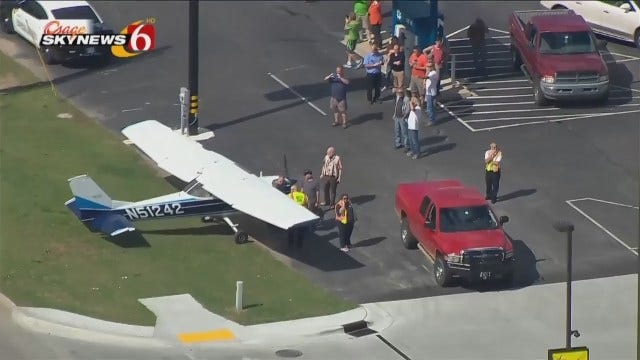NTSB: Cause Of Emergency Landing On Bixby Street Unknown
<p>The National Transportation Safety Board says it can't determine what caused the engine to quit on a small plane, forcing it to land on a Bixby road last spring.</p>Wednesday, October 12th 2016, 11:09 am
The National Transportation Safety Board says it can't determine what caused the engine to quit on a small plane, forcing it to land on a Bixby road last spring.
No one was hurt when the Cessna 150 landed on Memorial near 121st Street on the afternoon of April 21, 2016.
4/21/2016: Related Story: Small Plane Lands On Memorial Drive In Bixby
The pilot, 43-year-old Jason Cuckler, was rated as an airline transport pilot and told the NTSB he had just purchased the plane in Rolla, Missouri. He said he took off with full fuel tanks, which would have given him five hours of flight time, but that the flight was only three hours.
Cuckler was on final approach to Jones Riverside Airport when the engine quit, he told the NTSB. He restarted it but it quit again. When it quit a third time he declared an emergency and landed on the road, barely missing vehicles.
Cuckler told the NTSB that just as he was about to land a car pulled out of a parking lot directly into his path. He pulled up to miss it, then pushed the nose down to miss power lines.
The left wing hit a sign which spun the airplane sideways.
5/4/2016: Related Story: NTSB: Pilot Had To Dodge Car To Make Emergency Landing On Bixby Street
In its Final Report on the incident, the NTSB says it can't determine why the engine quit. The wings had been removed so that the airplane could be moved off the road, and an "unquantified amount of fuel was drained from the fuel tanks," according to the report.
The FAA investigator who inspected the engine after the incident said there was no fuel residue in the fuel line to the carburetor. The investigator said there was fuel in the carburetor but not enough for the engine to run.
The NTSB said the inspector found low compression in two of the engine's four cylinders, but the test was done when the engine was cold, which may have provided unreliable results.
The NTSB lists the probable cause of the incident as:
A total loss of engine power for reasons that could not be determined, as the fuel state of the airplane at the time of the accident could not be verified, and postaccident examination of the engine did not provide adequate information.
More Like This
October 12th, 2016
September 29th, 2024
September 17th, 2024
Top Headlines
December 12th, 2024
December 12th, 2024
December 12th, 2024
December 12th, 2024











